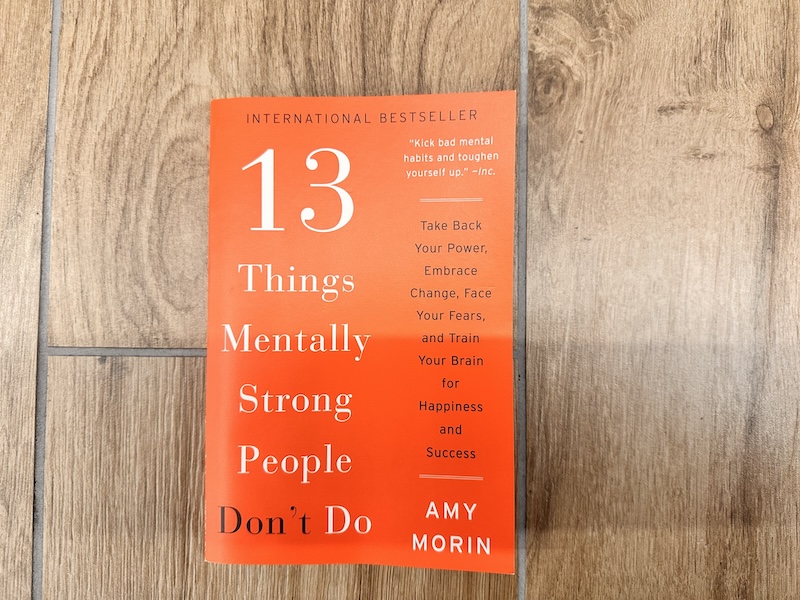Mental Strength: What 13 Things Mentally Strong People Don’t Do Teaches Us

In 13 Things Mentally Strong People Don’t Do, Amy Morin explores the behaviors and habits that prevent people from reaching their full mental strength and potential. Instead of focusing on what mentally strong people do, Morin turns the tables and reveals the key things they avoid—guiding readers on how to break bad habits and cultivate resilience.
Why Focus on What Not to Do?
Morin’s approach is unique: she focuses on eliminating negative habits rather than solely building positive ones. The idea is that by recognizing and stopping behaviors that drain your mental strength, you can create space for growth, happiness, and success. Morin’s personal experience, combined with her expertise as a psychotherapist, adds depth to her strategies for overcoming life’s challenges.
Key Lessons from the Book
They Don’t Waste Time Feeling Sorry for Themselves
One of the core ideas of the book is that mentally strong people refuse to dwell in self-pity. Morin emphasizes that while feeling down is normal, allowing it to consume you is counterproductive. Instead, mentally strong individuals focus on problem-solving and finding solutions, rather than wallowing in their problems.
They Don’t Give Away Their Power
Mentally strong people are in control of their emotions and actions. Morin explains that when you let others dictate how you feel or behave, you give away your power. To regain control, you must take responsibility for your own life, setting boundaries, and not letting others' opinions or actions control you.
They Don’t Shy Away from Change
Change is inevitable, and mentally strong people not only accept this but embrace it. Morin stresses the importance of adapting to new circumstances, viewing change as an opportunity for growth rather than a threat. Developing flexibility in the face of uncertainty is a hallmark of mental strength.
They Don’t Dwell on the Past
Mentally strong individuals focus on the present and the future rather than being consumed by past regrets or mistakes. Morin encourages readers to learn from their past but not let it dictate their current decisions or outlook.
They Don’t Fear Taking Calculated Risks
Taking risks is essential for growth, but mentally strong people approach risks with careful consideration and planning. Morin explains that it’s not about being reckless; it’s about weighing the pros and cons and having the courage to step out of your comfort zone when the reward is worth it.
They Don’t Resent Other People’s Success
Comparison is often the thief of joy, and mentally strong people avoid resenting others for their success. Instead, they focus on their own path and use others' achievements as inspiration rather than a source of envy.
Building Mental Strength Through Awareness
Morin’s book provides readers with practical strategies for becoming more resilient by avoiding the mental habits that hold them back. Each chapter offers concrete examples, reflective exercises, and action steps to help readers break free from negative patterns and build mental toughness.
13 Things Mentally Strong People Don’t Do is a powerful guide for anyone looking to strengthen their mind and navigate life’s challenges with more resilience. Amy Morin’s no-nonsense approach encourages readers to face their fears, embrace change, and stop self-sabotaging behaviors that weaken their mental resolve.
If you’re ready to stop standing in your own way and take back your power, this book provides the roadmap to getting there. By focusing on what not to do, Morin helps readers clear the mental clutter and focus on building a stronger, more resilient mindset.
Have you read 13 Things Mentally Strong People Don’t Do? What habits are you working to eliminate from your life? Let me know in the comments!
#13ThingsMentallyStrongPeopleDontDo #AmyMorin #MentalStrength #Resilience #SelfImprovement #GrowthMindset
Why Focus on What Not to Do?
Morin’s approach is unique: she focuses on eliminating negative habits rather than solely building positive ones. The idea is that by recognizing and stopping behaviors that drain your mental strength, you can create space for growth, happiness, and success. Morin’s personal experience, combined with her expertise as a psychotherapist, adds depth to her strategies for overcoming life’s challenges.
Key Lessons from the Book
They Don’t Waste Time Feeling Sorry for Themselves
One of the core ideas of the book is that mentally strong people refuse to dwell in self-pity. Morin emphasizes that while feeling down is normal, allowing it to consume you is counterproductive. Instead, mentally strong individuals focus on problem-solving and finding solutions, rather than wallowing in their problems.
They Don’t Give Away Their Power
Mentally strong people are in control of their emotions and actions. Morin explains that when you let others dictate how you feel or behave, you give away your power. To regain control, you must take responsibility for your own life, setting boundaries, and not letting others' opinions or actions control you.
They Don’t Shy Away from Change
Change is inevitable, and mentally strong people not only accept this but embrace it. Morin stresses the importance of adapting to new circumstances, viewing change as an opportunity for growth rather than a threat. Developing flexibility in the face of uncertainty is a hallmark of mental strength.
They Don’t Dwell on the Past
Mentally strong individuals focus on the present and the future rather than being consumed by past regrets or mistakes. Morin encourages readers to learn from their past but not let it dictate their current decisions or outlook.
They Don’t Fear Taking Calculated Risks
Taking risks is essential for growth, but mentally strong people approach risks with careful consideration and planning. Morin explains that it’s not about being reckless; it’s about weighing the pros and cons and having the courage to step out of your comfort zone when the reward is worth it.
They Don’t Resent Other People’s Success
Comparison is often the thief of joy, and mentally strong people avoid resenting others for their success. Instead, they focus on their own path and use others' achievements as inspiration rather than a source of envy.
Building Mental Strength Through Awareness
Morin’s book provides readers with practical strategies for becoming more resilient by avoiding the mental habits that hold them back. Each chapter offers concrete examples, reflective exercises, and action steps to help readers break free from negative patterns and build mental toughness.
13 Things Mentally Strong People Don’t Do is a powerful guide for anyone looking to strengthen their mind and navigate life’s challenges with more resilience. Amy Morin’s no-nonsense approach encourages readers to face their fears, embrace change, and stop self-sabotaging behaviors that weaken their mental resolve.
If you’re ready to stop standing in your own way and take back your power, this book provides the roadmap to getting there. By focusing on what not to do, Morin helps readers clear the mental clutter and focus on building a stronger, more resilient mindset.
Have you read 13 Things Mentally Strong People Don’t Do? What habits are you working to eliminate from your life? Let me know in the comments!
#13ThingsMentallyStrongPeopleDontDo #AmyMorin #MentalStrength #Resilience #SelfImprovement #GrowthMindset

